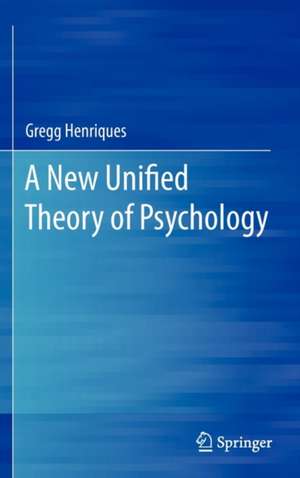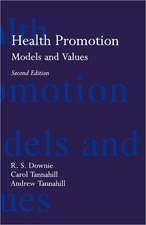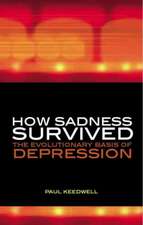A New Unified Theory of Psychology
Autor Gregg Henriquesen Limba Engleză Hardback – 17 aug 2011
A New Unified Theory of Psychology introduces a new system that addresses psychology’s current theoretical and philosophical difficulties. The new theory consists of four interlocking pieces that together provide—for the first time—a macro-level view that clarifies the nature of psychology’s problems and offers a clear way to unify the various elements of the field. The unified theory provides the field of psychology with a well-defined subject matter, allowing both academic and professional psychologists will be able to develop a shared language and conceptual foundation.
| Toate formatele și edițiile | Preț | Express |
|---|---|---|
| Paperback (1) | 905.70 lei 43-57 zile | |
| Springer – 19 sep 2014 | 905.70 lei 43-57 zile | |
| Hardback (1) | 912.82 lei 43-57 zile | |
| Springer – 17 aug 2011 | 912.82 lei 43-57 zile |
Preț: 912.82 lei
Preț vechi: 960.87 lei
-5% Nou
Puncte Express: 1369
Preț estimativ în valută:
174.70€ • 181.90$ • 147.64£
174.70€ • 181.90$ • 147.64£
Carte tipărită la comandă
Livrare economică 10-24 martie
Preluare comenzi: 021 569.72.76
Specificații
ISBN-13: 9781461400578
ISBN-10: 1461400570
Pagini: 310
Ilustrații: XVII, 290 p.
Dimensiuni: 155 x 235 x 25 mm
Greutate: 0.61 kg
Ediția:2011
Editura: Springer
Colecția Springer
Locul publicării:New York, NY, United States
ISBN-10: 1461400570
Pagini: 310
Ilustrații: XVII, 290 p.
Dimensiuni: 155 x 235 x 25 mm
Greutate: 0.61 kg
Ediția:2011
Editura: Springer
Colecția Springer
Locul publicării:New York, NY, United States
Public țintă
ResearchCuprins
I.-Introduction and Background.-From Racing Horses to Seeing the Elephant.-The Problem of Psychology.-The Tree of Knowledge System.-Behavioral Investment Theory.-The Influence Matrix.-The Justification Hypothesis.-II.Applying the Unified Theory to Psychotherapy and Psychological Phenomena.-Unifying Psychotherapy.-Depression as a State of Behavioral Shutdown.-A Conceptual Map of Well-Being.-Integrating Perspectives on Intimate Partner Violence.-III.Conclusion.-Toward the 5th Joint Point.
Recenzii
From the reviews:
"...the author takes on the extremely ambitious challenge of defining psychology, articulating conceptually its relations with other sciences, identifying its key theoretical principles, and resolving its various schisms (research/practice, neuroscience/social science, animal/human, bewildering array of seemingly nonoverlapping theories and therapies)...He has a terrific ability to describe, analyze, and summarize in a few pages massive and complicated areas of research (attributions, cognitive dissonance, behavioral models of depression.......) without getting bogged down in study details...I especially enjoyed the more personal details and anecdotes the book format gave him the space to include -- e.g., development of the "Justification Hypothesis" as the "joint point" between Mind and Culture takes off from his reflections on why he was late getting home for dinner one night in grad school. And some of his comments on psychotherapy integration take as point of departure detailed analysis of what he observed as project director for a clinical trial of cognitive therapy in prevention of recurrent suicide attempts that never made the final published report of the study...All told, it's not light reading, but if you enjoy thinking about big picture topics you will find a lot of food for thought here." (Dave Haaga, American University, September 2011)
"Like sociology and anthropology, psychology is defined by incompatible competing schools of thought.and cannot be considered a mature science, because there is no sense in which each generation of researchers builds upon the core analytical insights of previous generations of researchers… This book is written for clinical and research psychologists, and hence avoids the sort of mathematical model building and axiomatization that is characteristic of mature sciences… Henriques notes that it is almost impossible to define contemporary psychology because manypsychologists consider psychology to be a theory of the workings of the mind, while others deny the notion of "mind" altogether, and limit themselves to modeling observed behavior. For this reason, Henriques takes his first goal to be that of "locating" the field ontologically. He argues that there is a Tree of Knowledge with four segments. The first is "Matter," which is studied by physics, chemistry, geology, and astronomy. The second is "Life," studied by biology. The third is "Mind," which is the subject matter of psychology, and the fourth, and highest, is "Culture," studied by the social sciences. Henriques pays special attention to the three points of junction between segments of the Tree of Knowledge. He says the Matter-Life junction is modeled by biological evolutionary theory, the Life-Mind junction is modeled by what he calls Behavioral Investment Theory, and the Mind-Culture junction is modeled by what he calls Justification Theory. By Behavioral Investment Theory, Henriques means essentially the rational choice model of decision, biological and economic theory, although he adds a dimension of complexity to human behavior by saying that Justification Theory requires a "rational emotional actor" that is not properly modeled in standard rational choice theory (p., 46). I might add that Henriques also includes game theory as part of Behavioral Investment Theory, simply because decision-making when there are multiple agents involved requires game-theoretic reasoning. This point of view is basic to economic theory. In biology, the extension of decision theory (e.g., foraging theory) to game theory was pioneered by John Maynard Smith, Evolution and the Theory of Games (Cambridge University Press, 1982), and now is standard in all of animal behavior theory. In Henriques' innovative terminology, social interactions are governed by an "Influence Matrix," which is part of the psychology of the individual that regulates how the individual relates to others. Henriques stresses the emotional side of such interaction and avoids all game theoretic reasoning as well as any analysis of the role of incentives and payoffs in the choice of behaviors governed by the Influence Matrix… I believe Henriques' espousal of Behavioral Investment Theory is the most important integrating concept in this book. If this principle alone were incorporated uniformly throughout research psychology, it would provide much of the sought-for analytical core…A New Unified Theory of Psychology is terrifically challenging, to the point of perhaps being a new beginning for psychology as a research discipline.” (Herb Gintis, Santa Fe Institute and Central European University, September 2011)
“Offers a set of nested frameworks that puts different parts of psychological research and practice into a coherent relationship with each other. … It is also helpful that the book has excellent transitions, with summaries frequently reminding the readers where they have been and anticipating where they are going. … If I could teach a graduate-level Introduction to Psychology, this would be the book. If I could recommend one book to colleagues distraught at the fragmented nature of the field, this would be the book.” (Eric P. Charles, PsycCRITIQUES, Vol. 57 (26), July, 2012)
"...the author takes on the extremely ambitious challenge of defining psychology, articulating conceptually its relations with other sciences, identifying its key theoretical principles, and resolving its various schisms (research/practice, neuroscience/social science, animal/human, bewildering array of seemingly nonoverlapping theories and therapies)...He has a terrific ability to describe, analyze, and summarize in a few pages massive and complicated areas of research (attributions, cognitive dissonance, behavioral models of depression.......) without getting bogged down in study details...I especially enjoyed the more personal details and anecdotes the book format gave him the space to include -- e.g., development of the "Justification Hypothesis" as the "joint point" between Mind and Culture takes off from his reflections on why he was late getting home for dinner one night in grad school. And some of his comments on psychotherapy integration take as point of departure detailed analysis of what he observed as project director for a clinical trial of cognitive therapy in prevention of recurrent suicide attempts that never made the final published report of the study...All told, it's not light reading, but if you enjoy thinking about big picture topics you will find a lot of food for thought here." (Dave Haaga, American University, September 2011)
"Like sociology and anthropology, psychology is defined by incompatible competing schools of thought.and cannot be considered a mature science, because there is no sense in which each generation of researchers builds upon the core analytical insights of previous generations of researchers… This book is written for clinical and research psychologists, and hence avoids the sort of mathematical model building and axiomatization that is characteristic of mature sciences… Henriques notes that it is almost impossible to define contemporary psychology because manypsychologists consider psychology to be a theory of the workings of the mind, while others deny the notion of "mind" altogether, and limit themselves to modeling observed behavior. For this reason, Henriques takes his first goal to be that of "locating" the field ontologically. He argues that there is a Tree of Knowledge with four segments. The first is "Matter," which is studied by physics, chemistry, geology, and astronomy. The second is "Life," studied by biology. The third is "Mind," which is the subject matter of psychology, and the fourth, and highest, is "Culture," studied by the social sciences. Henriques pays special attention to the three points of junction between segments of the Tree of Knowledge. He says the Matter-Life junction is modeled by biological evolutionary theory, the Life-Mind junction is modeled by what he calls Behavioral Investment Theory, and the Mind-Culture junction is modeled by what he calls Justification Theory. By Behavioral Investment Theory, Henriques means essentially the rational choice model of decision, biological and economic theory, although he adds a dimension of complexity to human behavior by saying that Justification Theory requires a "rational emotional actor" that is not properly modeled in standard rational choice theory (p., 46). I might add that Henriques also includes game theory as part of Behavioral Investment Theory, simply because decision-making when there are multiple agents involved requires game-theoretic reasoning. This point of view is basic to economic theory. In biology, the extension of decision theory (e.g., foraging theory) to game theory was pioneered by John Maynard Smith, Evolution and the Theory of Games (Cambridge University Press, 1982), and now is standard in all of animal behavior theory. In Henriques' innovative terminology, social interactions are governed by an "Influence Matrix," which is part of the psychology of the individual that regulates how the individual relates to others. Henriques stresses the emotional side of such interaction and avoids all game theoretic reasoning as well as any analysis of the role of incentives and payoffs in the choice of behaviors governed by the Influence Matrix… I believe Henriques' espousal of Behavioral Investment Theory is the most important integrating concept in this book. If this principle alone were incorporated uniformly throughout research psychology, it would provide much of the sought-for analytical core…A New Unified Theory of Psychology is terrifically challenging, to the point of perhaps being a new beginning for psychology as a research discipline.” (Herb Gintis, Santa Fe Institute and Central European University, September 2011)
“Offers a set of nested frameworks that puts different parts of psychological research and practice into a coherent relationship with each other. … It is also helpful that the book has excellent transitions, with summaries frequently reminding the readers where they have been and anticipating where they are going. … If I could teach a graduate-level Introduction to Psychology, this would be the book. If I could recommend one book to colleagues distraught at the fragmented nature of the field, this would be the book.” (Eric P. Charles, PsycCRITIQUES, Vol. 57 (26), July, 2012)
Notă biografică
Dr. Gregg Henriques is Associate Professor and Director of the Combined-Integrated Doctoral Program in Clinical and School Psychology at James Madison University. He received his Masters degree in Clinical/Community Psychology from the University of North Carolina-Charlotte in 1996 and his Ph.D. in Clinical Psychology at the University of Vermont in 1999. Prior to coming to JMU in 2003, he spent four years at the University of Pennsylvania where he worked with Dr. Aaron T. Beck, exploring the effectiveness of psychotherapy for individuals who recently attempted suicide.
Dr. Henriques has been working on the Tree of Knowledge System for just over a decade. During his Masters degree, he had become interested in the field of psychotherapy integration and began surveying diverse bodies of literature. It was late in 1996, while he was reading up on research in social cognitive theory, evolutionary psychology and psychodynamic theory that he had the key insight that led to the Justification Hypothesis. Six months after that pivotal idea, he had developed the basic structure of the Tree of Knowledge System.
Dr. Henriques has been working on the Tree of Knowledge System for just over a decade. During his Masters degree, he had become interested in the field of psychotherapy integration and began surveying diverse bodies of literature. It was late in 1996, while he was reading up on research in social cognitive theory, evolutionary psychology and psychodynamic theory that he had the key insight that led to the Justification Hypothesis. Six months after that pivotal idea, he had developed the basic structure of the Tree of Knowledge System.
Textul de pe ultima copertă
Summary
Following the demise of the so-called grand theories offered by luminaries like Sigmund Freud, B. F. Skinner, and Carl Rogers, the field of psychology largely gave up its early aspirations to paint a broad picture of the human condition, and now the discipline focuses primarily on empirical problems that have a relatively narrow scope. The consequence has been a proliferation of interesting findings with no real capacity to answer big questions or to generate a shared general understanding of the human condition. This book seeks to change the status quo and offers up a new unified theory of psychology that redefines the science and the profession and paints a new picture of human nature in the process.
_____________________________________________________________________________
Praise for
A New Unified Theory of Psychology
“The field of psychology is known for its paradoxical combination of sweeping scope and impressive micro-theories, on the one hand, and fragmentation and internecine squabbling, on the other. To this state of affairs, any serious effort to provide integration and unity within psychological knowledge and understanding is heartily welcomed. And Henriques' effort in this regard is not only serious, but one of the most cogent, scholarly, sophisticated, beautifully reasoned, clearly articulated, and accessibly written presentations of a unified theory in psychology that I have seen in my 50 years in the discipline.”
Daniel B. Fishman, Author of The Case for Pragmatic Psychology,
Professor, Rutgers University
“As the field of psychology has grown, so have the challenges of fragmentation and of misunderstandings. This brave book represents a noble quest to provide a broad, values-based, and scientific framework which holds the power to organize our work and move us forward in strong, new ways.”
Lawrence G. Calhoun, Author of Facilitating Post-Traumatic Growth,
Professor, University of North Carolina-Charlotte
“In this very ambitious book, Henriques makes a strong case for why bold efforts are needed in the fragmented realm of psychological research and theory. Although different readers will likely make different judgments about how well Henriques has succeeded in his aims, it nevertheless is an act of intellectual daring that can perhaps inspire psychologists to look outside the narrow confines of a single laboratory paradigm and open their thinking to how to address the full range of human behavior and experience.”
Paul L. Wachtel, Author of Therapeutic Communication,
Distinguished Professor, CUNY
“Concise, erudite, and practical, this book is a manifesto that challenges psychology to move past fragmented domains of knowledge to a consilient framework, which will allow multi-disciplinary discourse and scientific advances. I suggest all scientists, psychotherapists, and scholars spend some time familiarizing themselves with the concepts and suggestions presented in this seminal volume by a leading scholar.”
Jeffrey Magnavita, Author of Personality Guided Relational Psychotherapy, Founder of the Unified Psychotherapy Project
Following the demise of the so-called grand theories offered by luminaries like Sigmund Freud, B. F. Skinner, and Carl Rogers, the field of psychology largely gave up its early aspirations to paint a broad picture of the human condition, and now the discipline focuses primarily on empirical problems that have a relatively narrow scope. The consequence has been a proliferation of interesting findings with no real capacity to answer big questions or to generate a shared general understanding of the human condition. This book seeks to change the status quo and offers up a new unified theory of psychology that redefines the science and the profession and paints a new picture of human nature in the process.
_____________________________________________________________________________
Praise for
A New Unified Theory of Psychology
“The field of psychology is known for its paradoxical combination of sweeping scope and impressive micro-theories, on the one hand, and fragmentation and internecine squabbling, on the other. To this state of affairs, any serious effort to provide integration and unity within psychological knowledge and understanding is heartily welcomed. And Henriques' effort in this regard is not only serious, but one of the most cogent, scholarly, sophisticated, beautifully reasoned, clearly articulated, and accessibly written presentations of a unified theory in psychology that I have seen in my 50 years in the discipline.”
Daniel B. Fishman, Author of The Case for Pragmatic Psychology,
Professor, Rutgers University
“As the field of psychology has grown, so have the challenges of fragmentation and of misunderstandings. This brave book represents a noble quest to provide a broad, values-based, and scientific framework which holds the power to organize our work and move us forward in strong, new ways.”
Lawrence G. Calhoun, Author of Facilitating Post-Traumatic Growth,
Professor, University of North Carolina-Charlotte
“In this very ambitious book, Henriques makes a strong case for why bold efforts are needed in the fragmented realm of psychological research and theory. Although different readers will likely make different judgments about how well Henriques has succeeded in his aims, it nevertheless is an act of intellectual daring that can perhaps inspire psychologists to look outside the narrow confines of a single laboratory paradigm and open their thinking to how to address the full range of human behavior and experience.”
Paul L. Wachtel, Author of Therapeutic Communication,
Distinguished Professor, CUNY
“Concise, erudite, and practical, this book is a manifesto that challenges psychology to move past fragmented domains of knowledge to a consilient framework, which will allow multi-disciplinary discourse and scientific advances. I suggest all scientists, psychotherapists, and scholars spend some time familiarizing themselves with the concepts and suggestions presented in this seminal volume by a leading scholar.”
Jeffrey Magnavita, Author of Personality Guided Relational Psychotherapy, Founder of the Unified Psychotherapy Project
Caracteristici
Provides a workplace theory of integration Defines the science of psychology Offers insights relevant to both academic and clinical psychologists Includes supplementary material: sn.pub/extras








